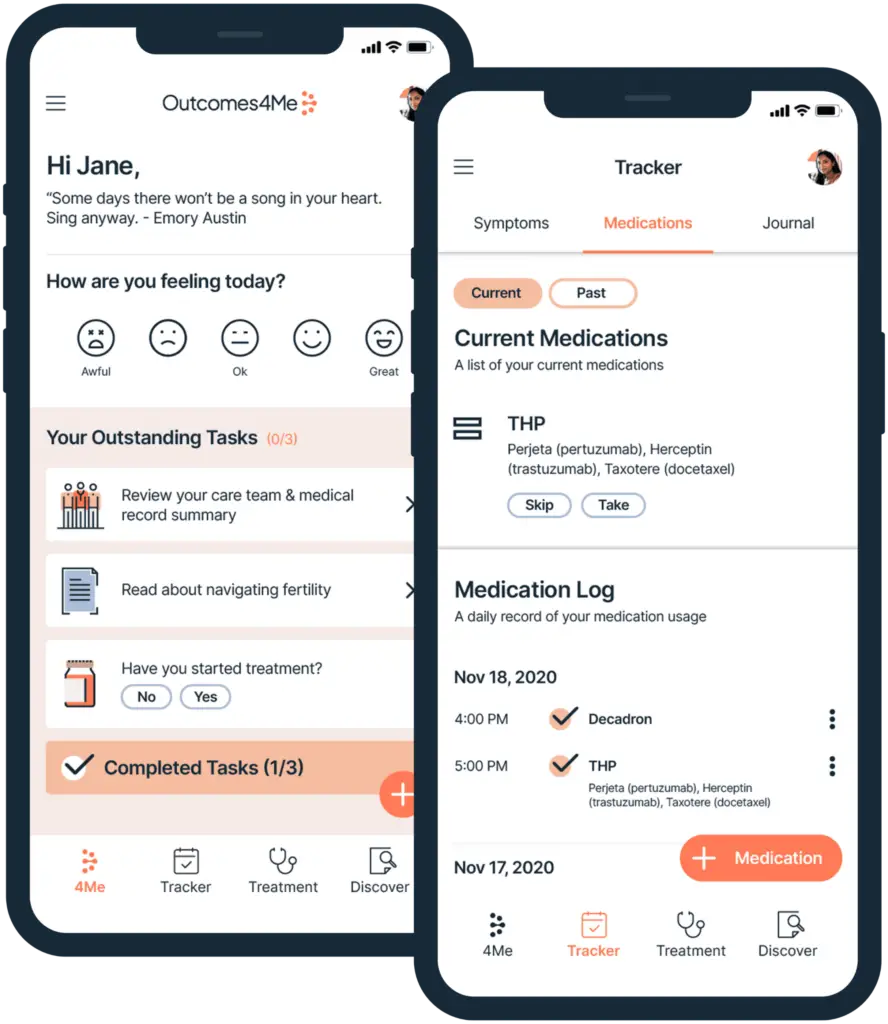Outcomes4Me is a 2024 Fast Company World Changing Idea! Learn more >>
Suzanne Garner
Cancer Survivor, Outcomes4Me User

We’re the only DCIS in situ breast cancer app that integrates with the NCCN Clinical Practice Guidelines in Oncology (NCCN Guidelines®), from the not-for-profit alliance of 33 leading cancer centers. The NCCN Guidelines® include comprehensive guidance related to all FDA-approved treatment options.
We gather DCIS in situ breast cancer treatment recommendations typically meant for oncologists and use Artificial Intelligence (AI) to translate that information so you can understand it, putting you in control. With this knowledge, you can feel empowered to make the best medical decisions with your care team.
With our free DCIS in situ breast cancer app, you’ll get:


Gain direct access to personalized treatment options so you can have more informed conversations with your care team.

Rely on us to help your patients get access to the best DCIS in situ breast cancer care and resources, and save time in your day. We’re here to help and won’t ever get in the way.

Accelerate patient access to your treatments and expand the reach of your DCIS in situ breast cancer research and clinical trials.
Get all the information you need to take a more active role in treating your DCIS in situ breast cancer.












When treated, DCIS has an excellent prognosis – 98 percent survival after 10 years. For most people, the disease is localized to a small area and DCIS treatment includes breast-conserving surgery (lumpectomy).
Stage zero breast cancer, also known as ductal carcinoma in situ (DCIS), refers to a non-invasive form of breast cancer where abnormal cells are found in the lining of a breast duct but have not spread into surrounding breast tissue.
Nearly all women with DCIS breast cancer can be cured with appropriate treatment.
Ductal Carcinoma In Situ (DCIS) is considered a non-invasive form of breast cancer, About 1 in 5 new breast cancers will be ductal carcinoma in situ (DCIS).
Yes. The American Cancer Society uses the term cancer survivor to refer to anyone who has ever been diagnosed with cancer no matter where they are in the course of their disease. This includes those who have had Ductal Carcinoma in Situ (DCIS).
DCIS can approximately double a woman’s chance of developing invasive breast cancer at some point in the future. Whether a patient ultimately develops invasive cancer and how long it takes, is highly dependent on the size and aggressiveness of the tumor, treatment given, lifestyle factors and age at diagnosis.
Most DCIS likely takes a long time — possibly years — to develop into invasive cancer, and some DCIS will never develop into invasive cancer.
Not all DCIS will progress to invasive cancer and predicting how quickly high-grade DCIS may progress to invasive cancer is not always straightforward. In some cases, high-grade DCIS can progress more rapidly than low-grade DCIS, but there isn’t a definitive timeline for this progression as it can vary significantly among individuals.
The goal of treatment for DCIS is to prevent recurrence or progression to invasive breast cancer. Many factors can affect the likelihood of and time to progression including treatment, tumor size, grade and type of DCIS, genetic factors, age, family history. Regular monitoring and appropriate treatment, such as surgery, radiation therapy, or hormone therapy, can significantly reduce the risk of progression to invasive cancer.
Source: Breast Cancer Research Foundation and ACS
https://www.cancer.org/cancer/types/breast-cancer/about/types-of-breast-cancer/dcis.html#:~:text=DCIS%20is%20also%20called%20intraductal,into%20the%20nearby%20breast%20tissue.
Source: American Cancer Society
https://www.cancer.org/cancer/types/breast-cancer/about/types-of-breast-cancer/dcis.html
Source: American Cancer Society
https://www.cancer.org/cancer/survivorship.html#:~:text=The%20American%20Cancer%20Society%20uses,during%20and%20after%20cancer%20treatment.
Source: https://www.bmj.com/content/369/bmj.m1570
NCCN Provider guidelines footnote
*From NCCN provider guidelines footnote: A number of factors determine local recurrence risk: palpable mass, larger size, higher grade, close or involved margins, and age <50 years.
Source: Dana-Farber Cancer Institute
https://www.dana-farber.org/cancer-care/treatment/breast-oncology/programs/ductal-carcinoma-in-situ#:~:text=Most%20DCIS%20likely%20takes%20a,goal%20of%20the%20DCIS%20program
We use cookies and other tracking technologies to offer you a better experience, personalize content and ads, enable social media functionality and to analyze our performance and site traffic. By clicking ‘Accept’ or closing this banner, you understand your information may be disclosed to our third-party partners. For more information, visit our Privacy Policy.
By clicking the “Subscribe Now” button you’re agreeing to our Terms of Service and Privacy Policy.